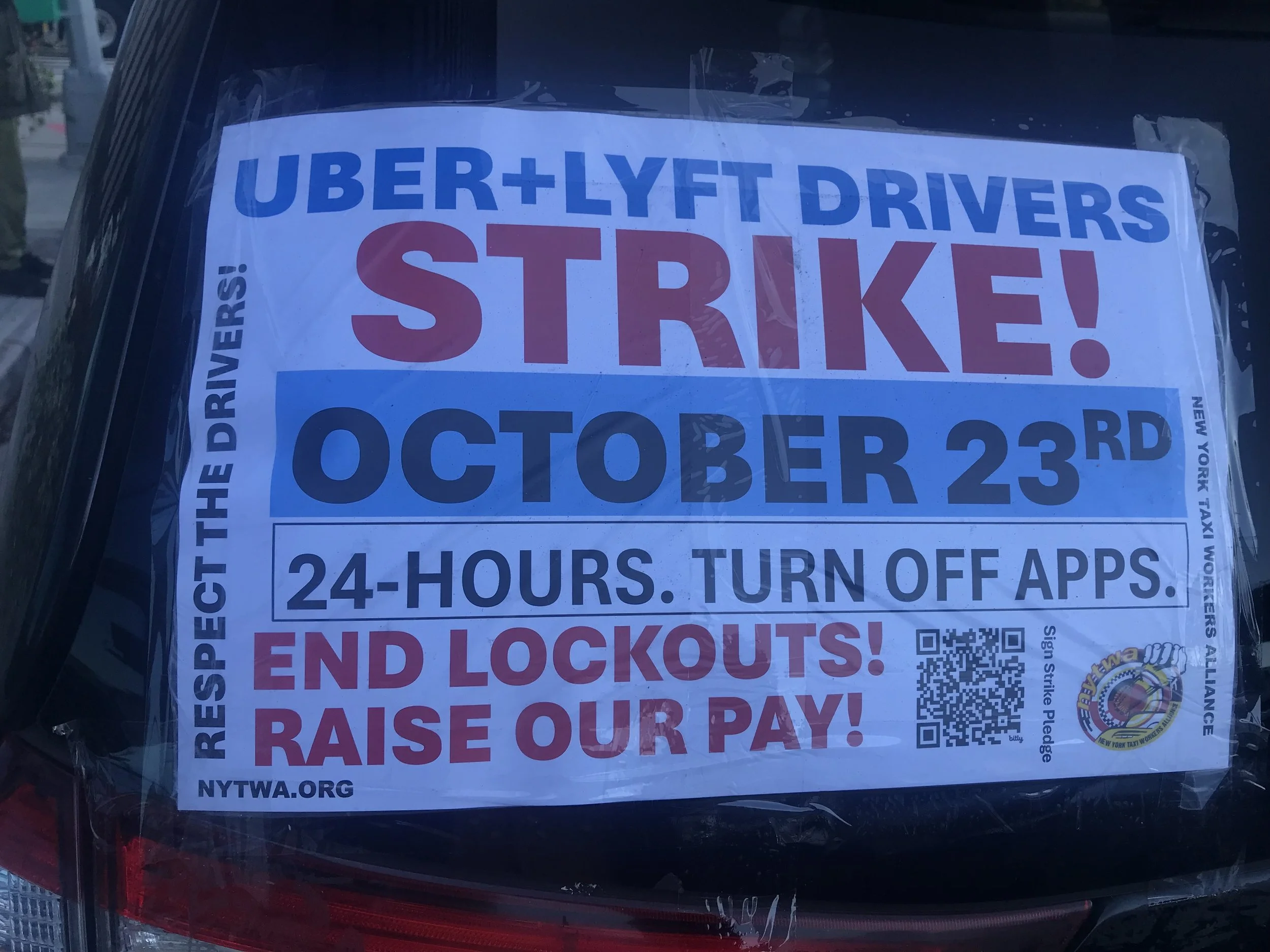NYC Drivers Push for Protections Against App Company ‘Deactivation’
NYC drivers working for Uber and Lyft struck earlier this week to protest company lockouts and deactivation. Now they hope a new bill in the City Council will deliver the protections they need. Photo/Steve Wishina
By Steve Wishnia
As a caravan of striking Uber and Lyft drivers neared City Hall on Oct. 23, many of their rear windshields bore “Stop Unfair Deactivations!” placards.
A bill pending in the New York City Council is intended to do just that. Intro 276, sponsored by Councilmember Shekar Krishnan (D-Queens) and 11 others, would prohibit the “wrongful deactivation” of drivers at the two “high-volume for-hire vehicle” companies.
The measure, Krishnan tells Work-Bites, would reform what he calls a “fundamentally unjust” system: Drivers are terminated by being denied access to the app, with no advance notice and no due process, and the employers are “the judge and jury.”
“I know this is the biggest issue that drivers face,” says Krishnan, who notes that his Jackson Heights-Elmhurst district is home to more cab drivers than any other in the city. “When drivers are unfairly terminated, they lose their livelihood overnight.”
Intro 276, he says, would shift the burden of proof onto the employers, instead of drivers having to prove their innocence in an appeal after they are deactivated.
It would require the two companies to give 14 days advance notice for disciplinary deactivations, and 120 days’ notice of layoffs for “bona fide economic reasons.” They could still fire drivers immediately for “egregious” misconduct or failure to perform duties, such as driving with a suspended license.
To show that they had a just cause for disciplinary deactivations, the companies would have to prove that the driver’s conduct had been “demonstrably and materially harmful”; that they had notified the driver in writing about why they were being terminated; that the rule involved was reasonable, widely known, and fairly applied; and that the investigation had been “fair and objective,” including considering mitigating circumstances and the driver’s work history.
The bill would impose a $500 fine on employers for first offenses.
Both parties could ask to have the case settled informally or by arbitration. If not, the city Department of Consumer and Worker Protection (DCWP), which oversees the rights of freelance workers, would handle the investigation.
DCWP told the Council’s Transportation Committee at a Sept. 27 hearing that it supports Intro 276, saying that “arbitrary or unfair deactivations are financially devastating for app-based workers,” as it has also seen with food-delivery workers.
Opposition
Uber told the Transportation Committee that the most common reasons for deactivation include expired documents, issues with their background checks, unsafe driving, altercations with customers, discrimination complaints, and having their customer ratings fall below the minimum average for the city.
The company said drivers cannot appeal dismissals for “zero tolerance violations,” such as criminal activity and physical or sexual altercations. Otherwise, it has an appeals process developed with input from the Independent Drivers Guild (IDG), an International Association of Machinists affiliate that has been partially funded by Uber.
The IDG opposes Intro 276. Policy director Andrew Greenblatt told a Council hearing Sept. 27 that it would replace the grievance procedure they negotiated, where drivers can have “trained advocates in our organization” represent them, with “a weaker process run by the city.”
He added that “nearly half of the drivers who are deactivated” are axed for having customer ratings below 4.75 out of 5, and that they can win reinstatement by completing the IDG’s professional-development classes.
“Our bill does nothing to preclude that process,” Krishnan responded. “Drivers have a choice between DCWP or arbitration.”
The IDG also objects to a provision intended to ban lockouts, defining them as an unfair deactivation. It argues that trying to prohibit lockouts, as well as the utilization-rate formula the city uses to determine what percentage of the fare will earn drivers the city’s minimum wage, will force smaller companies (that is, Lyft) to reduce the number of drivers “until the company s no longer viable.”
Lyft also opposes Intro 276, saying that not being able to deactivate drivers immediately “would create serious safety hazards” and that the bill “creates an excessive burden of proof that could force victims of crime to relive traumatic events by providing testimony or risk the driver being allowed back on the platform.”
Uber, however, did not explicitly oppose the bill. Instead, it wants it drastically narrowed: to apply only to permanent or long-term deactivations; to define “egregious misconduct” more specifically; and to reduce the warning-notice period to three days or less. It also does not want the Department of Consumer and Worker Protection to have any jurisdiction over drivers’ grievances, saying the Taxi and Limousine Commission knows the industry better.
Process ‘stacked against drivers’
Deactivation is the number-one issue for app-based drivers around the country, says New York Taxi Workers Alliance head Bhairavi Desai. The union has been working on legislation about it for more than two years.
Intro 276 is “an incredible bill,” Desai says. “It’s solid on establishing job security for a workforce that hasn’t had it in generations, and they’re working for companies where overhiring is part of the business model.”
“From the get-go, the process is stacked against drivers,” NYTWA told the Transportation Committee Sept. 30. Unlike traditional workers, it said, app-based drivers have no access to a manager or supervisor, and Lyft no longer has an in-person office for drivers in New York City. In many cases arising from customer complaints, it added, “drivers don’t know why they’ve been fired, making it impossible for them to challenge their firings, even if a fair process for such challenges existed.”
Drivers, NYTWA said, have reported being deactivated even when they had been assaulted by the passenger who complained or had refused requests to perform illegal turns or drop-offs.
The Transportation Committee has not yet voted on the bill. Krishnan says the sponsors are trying to get it passed “as quickly as possible.”

